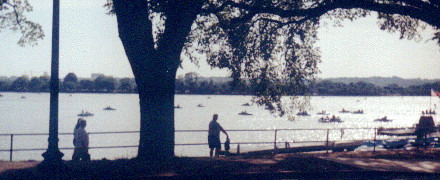Page D3
As It Happens The
Town Voice Balanced
Third Party Candidates in a Two Party
System
By Arlon StaywellRICHMOND — The political process in the United States is
often described as a two party system. It might be de
facto but not de
jure. It is by far a bicameral system de jure. That is, the
national legislature and most of the state legislatures consist of two
"chambers" or "houses" usually called the "senate" and the "house of
representatives." In Virgina, for example, the legislature is called the
"General Assembly" and consists of a "senate" and a "house of delegates."
Nebraska has a unicameral legislature. There is really nothing in the
constitution or any law, state or federal, which limits all candidates to any
party or number of parties.
But clearly two parties have
emerged. Since no directive in law requires it there is likely some other
reason. The simple and perhaps obvious reason is that "vote splitting"
undermines the "will" of the voters. That is for any question with two
sides, usually yes and no, if "A" takes one side and "B" takes the other then
whichever side "C" takes it will "split" the vote for that side into two groups
leaving the other side with a likely larger single group. The
representative for that group wins although holding a position which does not
likely have the most votes.
The solution whereby all voting is
done on the question rather than any representative is considered impractical
for the timing and large number of questions. This might help explain why
there is an electoral college and occasional disregard for some numbers.
It is important to note here a significant difference in this
dynamic and the one whereby wars seem to have only two sides. If "A" and
"B" are fighting and "C" attacks both then it incurs the wrath of "A" and "B,"
altogether a different process.
So for political rather than
military reasons two parties have emerged with their presumably unique
characters. It might well be that many of the votes received by the last
third party candidate to capture a significant portion in a United States
national election, H. Ross Perot, where actually votes for "none of the above"
than any particular item of policy or spending. It is one meaning that
might shine through in a system that has such an expectation of having only two
choices.
If that were the message it would seem those
established in the political machinery did not receive it as there still appears
no real choice being offered by the two parties. Or does there?
Which party would you expect to favor traditional marriage, oppose stem
cell research at the loss of embryos and to oppose abortion and
euthanasia? Which party would you expect to favor a strong and active
military?
Currently the Democrats seem aligned to one
objective, leaving Iraq. But will that solve the underlying problem? Is
immorality and godlessness a problem that needs attention and correction?
And if we are to become increasingly moral and godly why need we fight anyone
distressed with immorality and godlessness?
The need for a
third choice should be more clear now than when Perot took about a fifth of the
popular vote, but where is the third choice?
Will either
established party succeed in redefining itself? What sort of support will
be won and what sort alienated?
As I have noted often the
Republicans have come to believe that the military will prevent people from
doing whatever they want and the Democrats have come to believe the military
will enable people to do whatever they want. Current military
entanglements press for a resolution. Someone must change their thinking.
But when will that change come and when will we see it?
Is John McCain electable? Do the Democrats already have it wrapped
up? Need a third party join the fray?
The question is
whether in the United States there are enough people who understand and believe
there are things right and wrong and know another way to establish which is
which than at the point of a sword?
© MMVII by Arlon Ryan Staywell
The Town Voice Home |
Index of Politics D1 |
D2 |
D3 |
D4

The boats are rented foot-powered
paddleboats.
They are on the Potomac River as it passes through
Washington. D.C.
Photo by Arlon
Staywell

